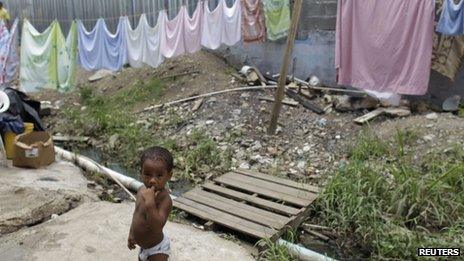Inequality 'highest for 20 years' - Save The Children
- Published
- comments

Save The Children says inequality harms children's life chances
Global inequalities in wealth are at their highest level for 20 years and are growing, according to a new report by Save The Children.
While the charity acknowledges progress has been made in goals such as reducing child mortality, the report says, external this has been uneven across income groups.
Continuing inequality could hinder further progress in improving living standards, the charity says.
The report comes ahead of a meeting of a high-level UN panel on poverty.
"In recent decades the world has made dramatic progress in cutting child deaths and improving opportunities for children; we are now reaching a tipping point where preventable child deaths could be eradicated in our lifetime," Save the Children's chief executive, Justin Forsyth, said.
"Unless inequality is addressed... any future development framework will simply not succeed in maintaining or accelerating progress. What's more, it will hold individual countries - and the world - back from experiencing real growth and prosperity," Mr Forsyth added.
Save The Children's researchers found that in most of the 32 developing countries they looked at, the rich had increased their share of national income since the 1990s.
In a fifth of the countries, the incomes of the poorest had fallen over the same period.
The gap has become particularly pronounced among children and affects their well-being as well as causing disparities in several key indicators, the charity says.
For example, it notes that in Tanzania, child mortality in the richest fifth of the population fell from 135 to 90 per 1,000 births over the research period, while the poorest fifth saw hardly any progress with a modest fall of 140 to 137 per 1,000 births.
- Published15 February 2012
- Published13 February 2012
- Published22 August 2012